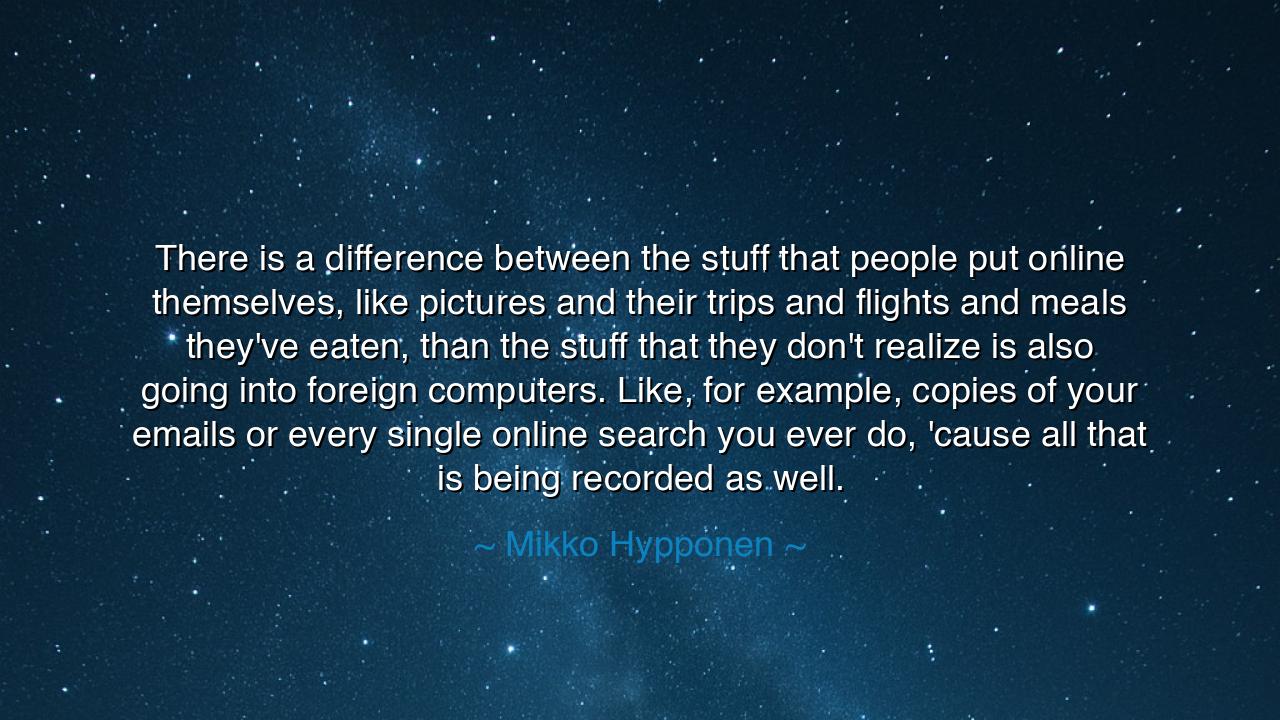
There is a difference between the stuff that people put online
There is a difference between the stuff that people put online themselves, like pictures and their trips and flights and meals they've eaten, than the stuff that they don't realize is also going into foreign computers. Like, for example, copies of your emails or every single online search you ever do, 'cause all that is being recorded as well.






In the shadowed realm of the modern age, where light travels not by torch or sun, but through the invisible veins of data, Mikko Hyppönen, a guardian of the digital frontier, spoke words that ring with grave wisdom: “There is a difference between the stuff that people put online themselves, like pictures and their trips and flights and meals they've eaten, than the stuff that they don't realize is also going into foreign computers. Like, for example, copies of your emails or every single online search you ever do, 'cause all that is being recorded as well.” In these words lies a warning — not against the machine, but against the complacency of man who has forgotten how easily freedom can be bartered for convenience. Hyppönen, a pioneer in cybersecurity, speaks as one who has seen behind the veil of the web — and found there not gods, but watchers.
The origin of this quote comes from Hyppönen’s work in uncovering the hidden powers that govern the Internet — governments, corporations, and unseen hands that harvest the trails we leave behind. As a defender against digital threats, he has witnessed the dual nature of technology: it can connect or control, enlighten or enslave. In his words, there echoes an ancient paradox — that man, in his quest for knowledge and comfort, often builds the very chains that bind him. The ancients forged weapons of bronze and iron; we, in our era, forge weapons of information. And yet, the danger remains the same: power, when unchecked, becomes possession.
When Hyppönen speaks of “the stuff that people put online themselves,” he refers to the voluntary sharing — the smiles, the journeys, the meals displayed for the world to see. These are the gifts we offer freely to the digital gods, the self-made monuments of our lives. But when he contrasts this with “the stuff that they don’t realize is also going into foreign computers,” his voice turns prophetic. He reveals the unseen flow of our lives — the emails, the searches, the whispers of thought and curiosity that are captured, copied, and stored in distant servers. What we believe to be private is, in truth, no longer our own. The Internet, he tells us, remembers more than we intend to share — and perhaps, more than we can ever forget.
There is an ancient story that mirrors this warning: the tale of Pandora’s Box. When Pandora lifted the lid, she released countless unseen evils into the world — yet she had opened it out of curiosity, not malice. So too, humanity has opened its digital box — a box filled with both wonder and danger. In our curiosity, we connected the world; in our eagerness, we forgot to guard our secrets. The evils released are not monsters of myth, but the silent systems that watch and record. Our every click, every query, every word written in haste becomes a thread woven into the great net that surrounds us. And as Hyppönen warns, even if we do not see the web, it sees us.
His wisdom also speaks to a greater philosophical truth: that privacy is the guardian of dignity. In ancient times, people guarded their homes with walls; today, the walls are invisible, and most have forgotten how to lock their gates. When we surrender our privacy, we surrender not only our secrets, but our autonomy — the ability to shape how we are seen and known. The danger, Hyppönen teaches, is not that information exists, but that it exists beyond our control, in foreign hands. The unseen powers of our era do not conquer by sword or fire, but by data — quiet, constant, and absolute.
Yet within his warning lies also a call to wisdom and action. Hyppönen does not call us to abandon technology, for he knows that the web is now woven into the fabric of life. Rather, he calls us to awareness — to remember that every act online is a trace, every click a footprint. He urges us to protect what is sacred: our thoughts, our communications, our human intimacy. We must learn to question where our information flows, to value privacy not as secrecy, but as sovereignty. To be wise in the digital age is to live with open eyes — to engage, but with discernment; to share, but with intention.
So, O listener, take heed of Mikko Hyppönen’s counsel. Live not as one lulled by convenience, but as one awakened to consequence. Guard your data as the ancients guarded their scrolls; speak online as though your words were carved in stone. Remember that in the age of information, the most precious possession is not wealth, but control — control over what you give, what you keep, and what defines you. For the Internet, vast and wondrous though it may be, is like the sea: it gives passage and power to those who know its currents, but it consumes those who drift without awareness.
The lesson of Hyppönen’s words is eternal — that every age of progress must rediscover the virtue of vigilance. We have built a world of infinite connection, yet it will only remain human if we guard the boundary between what should be shared and what must remain sacred. In the end, wisdom in the digital age is not to fear the machine, but to remember that behind every screen still beats the heart of a person — and that heart must remain free.






AAdministratorAdministrator
Welcome, honored guests. Please leave a comment, we will respond soon